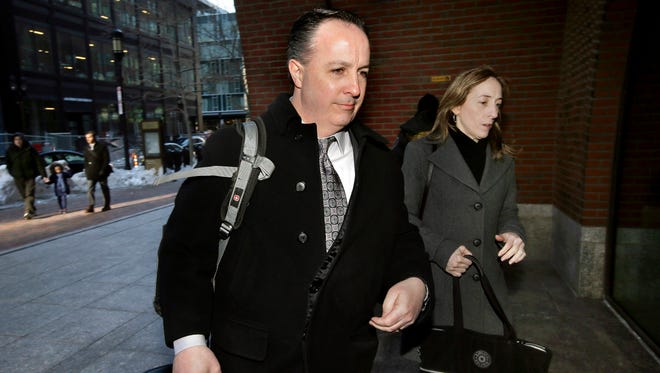Pharmacist acquitted of murder in deadly meningitis outbreak

BOSTON — A jury on Wednesday acquitted pharmacist Barry Cadden of murder charges in the deaths of 25 patients injected with steroids from his lab.
Cadden, however, was found guilty of racketeering, conspiracy and mail fraud charges. Some of the counts could bring a maximum sentence of 20 years. Sentencing was set for June 21.
Cadden, who earned tens of millions of dollars as co-founder and head pharmacist at New England Compounding Center (NECC) in Framingham, Mass., could have faced life in prison if convicted of the second-degree murder charges for his alleged role in a nationwide fungal meningitis outbreak in 2012. According to the U.S. Centers for Diseases Control and Prevention, 751 patients in 20 states suffered meningitis infections after being injected with NECC steroids. Sixty-four of them died.
Defense lawyer Bruce Singal argued there was no evidence Cadden was responsible for the deaths, rejecting the government’s claims that the center's disregard for health standards gave rise to mold, bacteria, flies and even oil seeping up through the floor.
Cadden was tried under the Racketeer Influenced and Corrupt Organizations act (RICO), which allows for trial on a range of charges, including mail fraud and interstate commerce violations. That breadth allowed the jury to punish Cadden, though less harshly than a murder conviction.
Eric Christofferson, an assistant U.S. attorney in the early days of the case who is now in private practice, said he wasn't surprised by the mixed verdict. Christofferson attended the closing arguments and said both sides spent a lot of "energy" on the murder charges. But he said proving intent for the second-degree murder charges was difficult.
"I'm sure the prosecutors are disappointed," Christofferson told USA TODAY. "They believed their case was strong. But he was still convicted of pretty serious crimes and faces a significant jail sentence."
Robert Bloom, a professor at Boston College Law School, said the evidence pointed to manslaughter — a charge that doesn't fit under the federal RICO statute. "I thought there would be somewhat of a compromise verdict, and so did the jury," Bloom said.
The family of Donald McDavid, who died after receiving tainted injections from a clinic in Crossville, Tenn., released a statement thanking the prosecutors, judge and jury for their efforts.
"Don was a good Christian man. We live with Don’s loss every day," the statement said. "We take some comfort in knowing Mr. Cadden will be held accountable for his actions. No matter how long Mr. Cadden spends in prison, it will never bring Don back.”
Cadden was the first defendant to be tried in the case. Supervisory pharmacist Glenn A. Chin, who allegedly oversaw the room where tainted batches were compounded, also faces second-degree murder and other charges.
Twelve others were initially charged with lesser crimes; some had their charges dropped. Others have pleaded guilty.
Contributing: Stacey Barchenger, The (Nashville) Tennessean